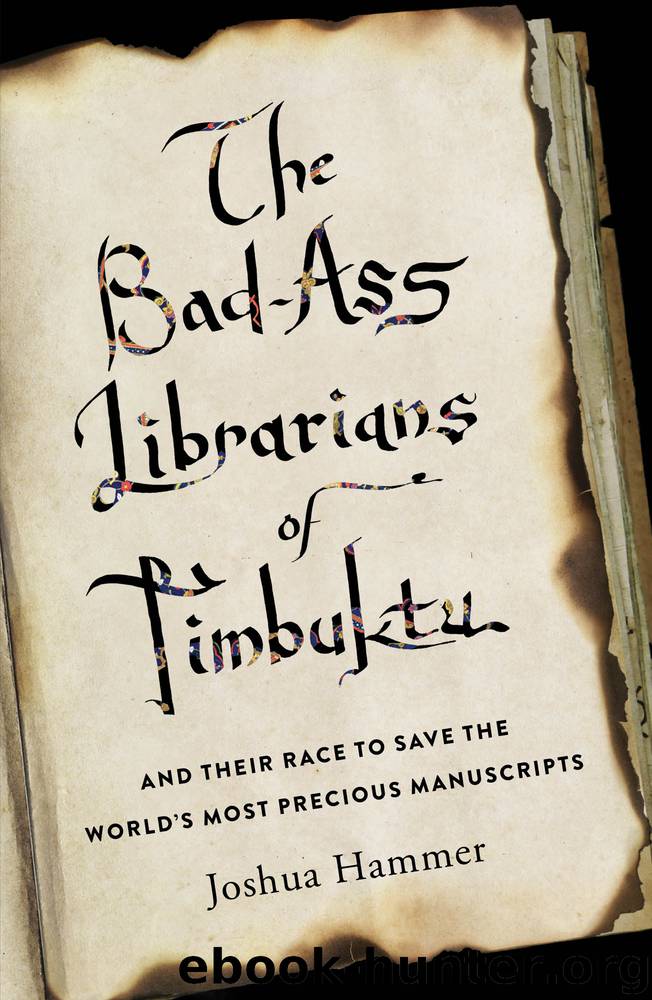The Bad-Ass Librarians of Timbuktu by Joshua Hammer

Author:Joshua Hammer
Language: eng
Format: epub
Publisher: Simon & Schuster
12
At his home in the Bella Farandja neighborhood, Abdel Kader Haidara paced the courtyard for long periods of reflection, pondering how to respond to the rebels’ seizure of Timbuktu. Largely thanks to Haidara’s initiatives, the city now had forty-five libraries, ranging from small private archives to ten-thousand-volume collections with exhibition spaces and conservation and digitization facilities that rivaled those in Europe and the United States. Most prominent were Haidara’s Mamma Haidara Commemorative Library in the Sankoré neighborhood and the Ahmed Baba Institute, housed since 2009 in an $8 million complex built by the South African government. The forty-five libraries served as repositories for a total of 377,000 manuscripts, ranging from four-hundred-page, leather-encased volumes to single folios, including some of the greatest works of medieval literature in the world.
The immediate threat to the manuscripts from the looting in Timbuktu had passed, but Haidara was gradually realizing that they faced a greater danger. He knew that many of the works epitomized the reasoned discourse and intellectual inquiry that the militants, with their rigid views of Islam, their intolerance, and their hatred of modernity and rationality, wanted to destroy. It was inevitable, he was coming to believe, that the manuscripts would become a target.
To be sure, jihadi spokesmen had appeared on radio and on television twice soon after their capture of Timbuktu, to reassure people that “we won’t harm the manuscripts.” But Haidara and most of his friends and colleagues dismissed the promise as a public relations ploy. “They went on television and assured us, ‘we know the value of the manuscripts, and we vow to protect them.’ And that’s the moment that people got afraid. We knew that they were lying,” said Sane Chirfi Alpha, Timbuktu’s director of tourism and a close friend of Haidara.
Timbuktu’s population, Chirfi explained, was savvy enough to understand that the mere act of acknowledging the manuscripts’ existence implied that the jihadis had them in their sights—and would turn against them when the time was right. “We could read between the lines,” Chirfi went on. “They told us that we had deviated from Islam, that we were practicing a religion full of innovations, not based on the original texts.” Deborah Stolk, the director of the Prince Claus Fund in the Netherlands, a major funder of manuscript conservation in Timbuktu, initially downplayed the peril, though it became clear to her later that the texts were endangered. “These manuscripts show a community in which science and religion coexisted and influenced each other,” she said. “That community is not in line with the one envisioned by Al Qaeda.”
Emily Brady had anticipated trouble in Timbuktu from the moment the coup d’état occurred in March. An American attorney, scholar, illustrator, translator (of an 1839 French grimoire, or book of the occult, entitled Treasure of the Old Man of the Pyramids), and poverty-eradication specialist in her fifties from Seattle, Washington, Brady (who requested that her real name not be used in this book) had first visited Mali in the 1990s. During that visit, she met Abdel Kader Haidara, and instantly became captivated by the manuscripts.
Download
This site does not store any files on its server. We only index and link to content provided by other sites. Please contact the content providers to delete copyright contents if any and email us, we'll remove relevant links or contents immediately.
Cecilia; Or, Memoirs of an Heiress — Volume 1 by Fanny Burney(31326)
Cecilia; Or, Memoirs of an Heiress — Volume 3 by Fanny Burney(30929)
Cecilia; Or, Memoirs of an Heiress — Volume 2 by Fanny Burney(30886)
The Great Music City by Andrea Baker(21197)
We're Going to Need More Wine by Gabrielle Union(18067)
Bombshells: Glamour Girls of a Lifetime by Sullivan Steve(13102)
Pimp by Iceberg Slim(12924)
All the Missing Girls by Megan Miranda(12741)
Fifty Shades Freed by E L James(12445)
Norse Mythology by Gaiman Neil(11876)
Talking to Strangers by Malcolm Gladwell(11865)
Crazy Rich Asians by Kevin Kwan(8343)
Mindhunter: Inside the FBI's Elite Serial Crime Unit by John E. Douglas & Mark Olshaker(7831)
The Lost Art of Listening by Michael P. Nichols(6465)
Enlightenment Now: The Case for Reason, Science, Humanism, and Progress by Steven Pinker(6404)
Bad Blood by John Carreyrou(5763)
The Four Agreements by Don Miguel Ruiz(5504)
Weapons of Math Destruction by Cathy O'Neil(5032)
We Need to Talk by Celeste Headlee(4863)
